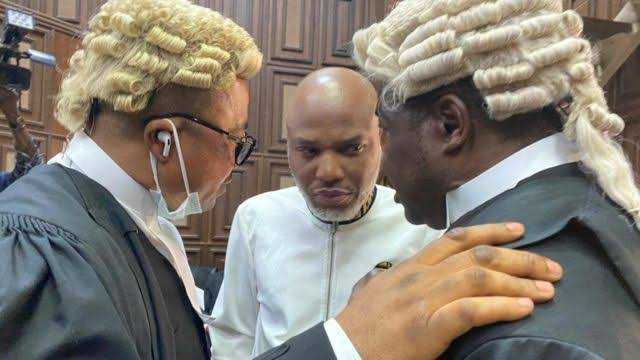Aloy Ejimakor, Special Counsel to detained leader of Indigenous People of Biafra, IPOB, Nnamdi Kanu, , yesterday, said the federal government cannot prosecute the leader of IPOB until it convinces the Nigerian courts and Britain that he was legally extradited to Nigeria.
He said both Nigerian law and international charters to which Nigeria is a signatory, forbids kidnapping of persons by the government. He said in the case of Nnamdi Kanu, the Nigerian government has not disputed Nnamdi Kanu’s claim that he was abducted in Kenya, tortured and brought to Nigeria in chains.
According to Ejimakor, “Nigeria must first explain to her domestic courts and the international community, particularly Britain, how Kanu ended up in Nigeria in chains. This is but a basic condition precedent without which prosecution of Nnamdi Kanu cannot ensue.”
Part of Ejimakor’s statement read: “Following the sudden appearance of Mazi Nnamdi Kanu in a Federal High Court in Abuja on 29th June, 2021, the Attorney-General of Nigeria (Abubakar Malami, SAN), at a press conference on the same date, stated that Kanu was “intercepted through the collaborative efforts of Nigerian intelligence and security services”. He added that “recent steps taken by the Federal Government saw to the interception of the fugitive Kanu on Sunday the 27th day of June 2021.
“Beyond this bland use of the word ‘interception’, neither the Attorney-General, nor any other Nigerian official has explained how and where this infamous interception occurred or whether it occurred under the pertinent legal framework or not. From published accounts, all efforts by the media (domestic and international) to elicit details of this interception have met a stubborn official silence. And it appears that the same is true with myriad diplomatic inquiries issued to Nigeria from the international community, notably from the United Kingdom and United Nations.
“Conversely, Nnamdi Kanu had, in various sworn statements, given credible accounts and details that prove that the so-called interception is simply that he was officially kidnapped, disappeared, tortured in Kenya, and extraordinarily renditioned to Nigeria.
“During the hearing of Kanu’s fundamental rights suit in Abia State (which he won), the Nigerian government could not explain how Kanu ended up in Nigeria, thus confirming that Kanu was not extradited but illegally renditioned. If Kanu was extradited, the Nigerian government would have been very forthright with it, especially given the insurmountable prosecutorial barrier that comes with extraordinary rendition.”
The statement further read: “It is therefore instructive that, to date, the Nigerian government has neither – in court or public – contradicted Kanu’s accounts, nor offered any alternative account that may suggest that Kanu’s return to Nigeria was secured through some due process of law. On its part, the Kenyan Government has, in the public and in processes filed in court, vehemently denied that Kanu was subjected to any extradition (or even deportation) proceedings in Kenya; and Nigeria has deadpanned to Kenya’s self-righteous denials.
“In view of the foregoing, there are several questions and answers well-meaning Nigerians and the international community must demand from Nigeria. These questions and answers are very crucial, because under the domestic and international legal order, Nigeria cannot properly levy its sovereign rights of criminal prosecution against Kanu without first proving that the act of transferring Kanu from Kenya to Nigeria conformed to the basic tenets of the law – municipal and international, including particularly treaties to which Nigeria is subject.
“A lot of people might not be aware but there’s a Nigerian law, enacted by the National Assembly in 1983, known as the African Charter on Human and Peoples Rights (Ratification and Enforcement) Act. You can see this Law at CAP A9, Laws of Federation of Nigeria, 2004. Article 12(4) of this Law provides that “A non-national legally admitted in a territory of a State Party to the present Charter, may only be expelled from it by virtue of a decision taken in accordance with the law.
“To be sure, Nnamdi Kanu, a non-national of Kenya, was legally admitted to Kenya on 5th May, 2021 and then expelled or was transferred from Kenya to Nigeria on 27th June, 2021 without ‘a decision taken in accordance with the law’. Both Nigeria and Kenya are state parties to the parent African Charter that grandfathered the similar law Nigeria later domesticated into its municipal laws.
“In view of the foregoing, it is trite that a renditioned fugitive suspect cannot be subjected to trial. Thus, Mazi Nnamdi Kanu should be restitutioned or restored to the status quo, whether to Kenya or Britain, at his option. It is inherently contradictory to postulate that a renditioned suspect will get a fair trial from the jurisdiction that renditioned him,” Ejimakor said.



